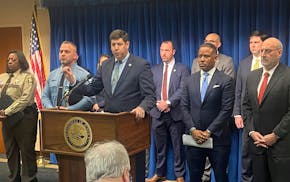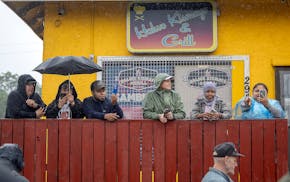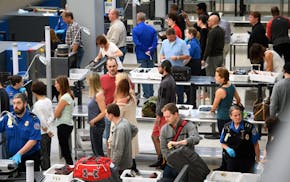Jurors in the federal racketeering conspiracy trial of three alleged Minneapolis Bloods gang members will begin deciding Friday whether street gangs can be treated as criminal enterprises akin to the mafia families of decades past.
An anonymous jury of 12 is expected to start deliberating in St. Paul after receiving a lengthy set of instructions from Judge Susan Richard Nelson. They'll decide a trial that started one month ago and was capped Thursday by closing arguments that spanned a full day.
Desean James Solomon, 34, of Richfield is charged with racketeering conspiracy, carrying and using a firearm in a crime of violence and aiding and abetting — all in connection to a series of crimes prosecutors said were to benefit the Minneapolis Bloods. Michael Allen Burrell, 44, of St. Pau, and Leontawan Holt, 26, of Minneapolis have also been on trial on charges of aiding and abetting and carrying and using a firearm in a crime of violence.
Assistant U.S. Attorney Esther Mignanelli, in making the government's final case to the jury, repeatedly punctuated descriptions of killings and drug trafficking with the coda of "they did this because they were Bloods."
"What does it mean to be a Blood? It means to prove yourself through the crimes you commit," she said. "It means peddling poisonous drugs throughout the city but especially your territory. It means carrying and sharing guns, and when you have that gun you're expected to use it. Because for Bloods, when one Blood moves they all move. When one Blood fights, they all fight. When one Blood shoots, they all shoot."
The case is a rare application of the federal Racketeer Influenced and Corrupt Organizations (RICO) statute to target a Minneapolis street gang. The three men on trial are among 80 charged to date under U.S. Attorney Andrew Luger's still-ongoing federal violent crime crackdown that has had a heavy emphasis on prosecuting gang members in the Twin Cities. Another RICO trial targeting the north Minneapolis Highs gang is expected to follow next year.
Two homicides, one in June 2020 and another in April 2022, underpin the government's RICO allegations, as well as open-air drug sales in the Bloods territory that includes George Floyd Square.
Defense attorneys on Thursday challenged the description of the Bloods as an organized criminal enterprise — instead painting it as an amalgamation of cliques and neighborhood groups that engage in sporadic violence.
"It's not an enterprise," said Thomas Plunkett, an attorney for Solomon. "It's a loosely affiliated bunch of people."
The notion that there is less structure within the Bloods today than in the past does not mean that there is no structure, Mignanelli later countered.
"The fact is that criminal enterprises are just messy," Mignanelli said. "They're not Fortune 500 companies."
Solomon and Burrell are being charged in connection with a June 2020 gun battle outside the 200 Club in north Minneapolis that saw 100 rounds fired and six people hit, including Burrell.
Burrell is the older brother of Myon Burrell, whose life sentence for murder was commuted in 2020 after he spent nearly two decades in prison. Prosecutors say the 200 Club shootout started when Michael Burrell and Solomon confronted a man who testified against Myon Burrell at both trials held in the murder of 11-year-old Tyesha Edwards in the mid-2000s.
Myon Burrell attended Thursday's closing arguments, and he previously watched multiple days of his older brother's trial.
Mignanelli said Michael Burrell fired the first shots in an encounter that included a dozen firearms being discharged. Burrell was shot in his buttocks during the exchange, and Solomon fired into the back of a Chevy Tahoe that prosecutors said contained Banks in the passenger seat. Banks was killed after being struck by a single bullet to his head. Mignanelli said forensic scientists concluded the bullet in Banks' head was fired by the same gun used to fire other spent cartridges linked to Solomon. But Plunkett disputed whether the bullet that killed Banks was indeed fired by his client.
Steven Wolter, Burrell's attorney, said Burrell's conflict with the man who twice testified against his brother more than a decade ago was a personal matter and not related to the Bloods.
"There is no evidence that Mr. Burrell acted to preserve or enhance his position within the Bloods gang," Wolter said.
The April 2022 killing was preceded by a brawl inside Williams Pub in Minneapolis' Uptown neighborhood. There, members of the Bloods encountered a member of the rival Tre Tre Crips who had stabbed a Blood in 2016. Holt threw the first punch at the man before a group of Bloods converged on their rival.
Later outside the bar, Holt retrieved a pair of guns from his car and handed one to a juvenile Bloods associate. Solomon meanwhile led a formation of Bloods looking for rivals outside, Mignanelli said. Holt fired the fatal shot at close range into Rayshawn Brown's chest around the same time Brown also fired a shot from a gun that jammed in his pocket.
Karen Mohrlant, Holt's attorney, argued that her client did not fire the shot that killed Brown until Brown aimed and fired at him as they crossed paths on a sidewalk near Williams Pub. The two were near each other earlier, Mohrlant said, and Holt could have shot Brown at that time if murder was his intent.
"This is classic self-defense, ladies and gentlemen," Mohrlant said. "There's absolutely no indication of premeditation or intent."
Mignanelli argued that in order to prove self-defense, Holt must show that he killed Brown to avert death or great bodily harm and that there was no reasonable chance of retreat to avoid that danger.
"Escalating and joining in that escalation from a bar fight to a gun fight is not good faith," Mignanelli said. "You cannot just go grab guns, go to a gun fight and claim self-defense in Minnesota. That makes no sense because we don't live in the Wild West."

Five members of Minneapolis Highs street gang found guilty of racketeering conspiracy

Midea recalling 1.7 million of its popular air conditioners due to mold concern

Social media, text chains helped anti-ICE protesters get the word out during Minneapolis raid

TSA agents seize two loaded guns on the same day at MSP Airport

